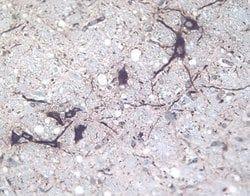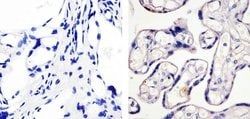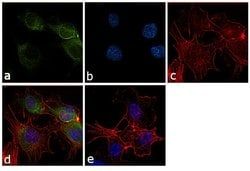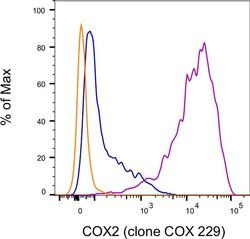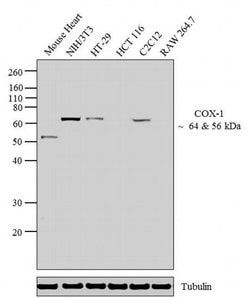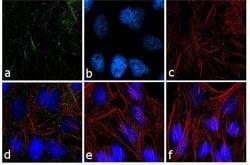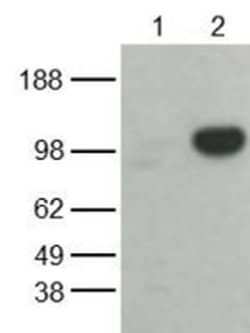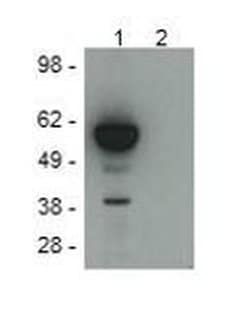iNOS Monoclonal Antibody (CXNFT), eBioscience™, Invitrogen™
Manufacturer: Invitrogen
Select a Size
| Pack Size | SKU | Availability | Price |
|---|---|---|---|
| Each of 1 | 50-112-2699-Each-of-1 | In Stock | ₹ 25,899.00 |
50-112-2699 - Each of 1
In Stock
Quantity
1
Base Price: ₹ 25,899.00
GST (18%): ₹ 4,661.82
Total Price: ₹ 30,560.82
Antigen
iNOS
Classification
Monoclonal
Concentration
0.5 mg/mL
Formulation
PBS with 0.09% sodium azide; pH 7.2
Gene Accession No.
P29477
Gene Symbols
Nos2
Purification Method
Affinity chromatography
Regulatory Status
RUO
Gene ID (Entrez)
18126
Content And Storage
4° C
Form
Liquid
Applications
Flow Cytometry, Immunocytochemistry, Western Blot
Clone
CXNFT
Conjugate
Unconjugated
Gene
Nos2
Gene Alias
Hepatocyte NOS; hepatocytes; HEP-NOS; inducible nitric oxide synthase; inducible NO synthase; Inducible NOS; iNos; i-NOS; Inosl; MAC-NOS; macrophage NOS; nitric oxide synthase 2; nitric oxide synthase 2, inducible; nitric oxide synthase 2, inducible, macrophage; nitric oxide synthase 2A (inducible, hepatocytes); nitric oxide synthase, inducible; nitric oxide synthase, macrophage; nitric oxide synthase-inducible; NOS; NOS type II; NOS, type II; Nos2; Nos-2; Nos2a; NOS-II; OTTMUSP00000000202; peptidyl-cysteine S-nitrosylase NOS2
Host Species
Rat
Quantity
100 μg
Primary or Secondary
Primary
Target Species
Mouse
Product Type
Antibody
Isotype
IgG2a κ
Related Products
Description
- Description: This CXNFT monoclonal antibody reacts to mouse NOS2 (inducible NOS, iNOS)
- Nitric oxide synthase enzymes catalyze the formation of nitric oxide from L-arginine through an NADPH- and oxygen-dependent mechanism
- There are three isoforms of NOS that are encoded by three separate genes
- NOS1 (neuronal NOS, nNOS) and NOS3 (endothelial NOS, eNOS) are constitutively expressed, while NOS2 is induced in response to bacterial endotoxins and inflammatory cytokines such as IFN gamma and TNF alpha
- NOS2 is expressed by myeloid-derived suppressor cells and M1 macrophages but not alternatively activated M2 macrophages
- NOS enzymes are functionally active only when they form homodimers, and dimerization of NOS2 occurs at steady-state concentrations of free Ca2+ such that NOS2 is functionally active when it is produced
- Applications Reported: This CXNFT antibody has been reported for use in intracellular staining followed by flow cytometric analysis, and western blotting
- (Fluorochrome conjugated CXNFT is recommended for use in intracellular flow cytometry.)
- Applications Tested: This CXNFT antibody has been tested by immunoblot analysis of LPS-stimulated mouse thioglycolate-elicited peritoneal exudate cells or by intracellular staining and flow cytometric analysis of mouse NOS2-transiently transfected HEK-293T cells
- For immunoblot analysis this can be used at 5 μg/mL
- For intracellular staining this can be used at less than or equal to 0.25 μg per test
- iNOS (Inducible Nitric oxide, NO, NOS) is an inorganic, gaseous free radical that carries a variety of messages between cells
- Vasorelaxation, neurotransmission and cytotoxicity can all be potentiated through cellular response to NO
- NO production is mediated by members of the nitric oxide synthase (NOS) family
- iNOS is expressed in liver and inducible by a combination of lipopolysaccharide and certain cytokines
- NOS catalyzes the oxidization of L-arginine to produce L-citrulline and NO
- Two constitutive isoforms, brain or neuronal NOS (b or nNOS, type I) and endothelial cell NOS (eNOS, type III), and one inducible isoform (iNOS, type II), have been cloned
- All NOS isoforms contain calmodulin, nicotinamide adenine dinucleotide phosphate (NADPH), flavin adenine dinucleotide (FAD), and flavin mononucleotide (FMN) binding domains
- iNOS is found in a variety of cell types including macrophages, hepatocytes, synoviocytes, and smooth muscle cells
- Cytokines such as interferon-gamma (IFN), tumor necrosis factor (TNF), interleukin-1 and -2, and lipopolysaccarides (LPS) cause an increase in iNOS mRNA, protein, and activity levels
- Protein kinase C-stimulating agents exhibit the same effect on iNOS activity
- After cytokine induction, iNOS exhibits a delayed activity response which is then followed by a significant increase in NO production over a long period of time
- Three related iNOS pseudogenes are located within the Smith-Magenis syndrome region on chromosome 17
- Diseases associated with iNOS dysfunction include achalasia and impotence.
